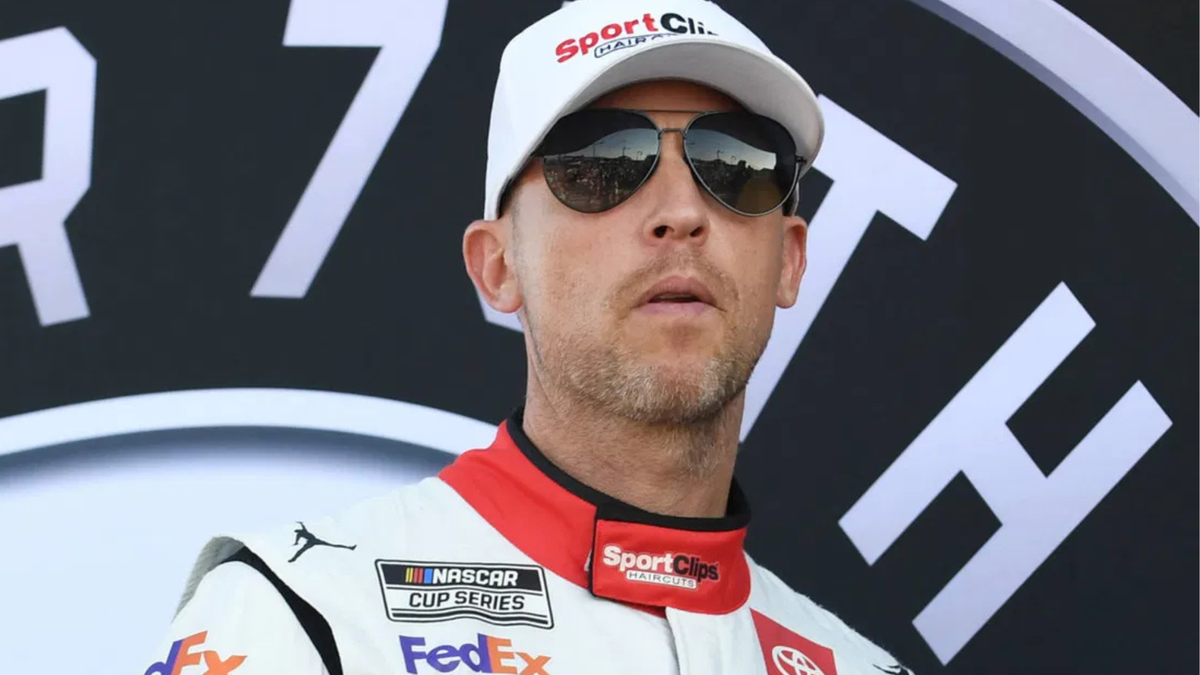
Imago
Denny Hamlin | Credits – IMAGO

Imago
Denny Hamlin | Credits – IMAGO
NASCAR’s playoff format has always stirred debate. Its high-stakes finale and knockout rounds bring excitement, but also plenty of criticism. So when a bold new theory went viral, even veteran driver Denny Hamlin couldn’t stay silent. After a media personality’s controversial “Bright Light theory” went viral, the 44-year-old stepped in to challenge it.
Watch What’s Trending Now!
Unlike traditional motorsport championships that reward season-long consistency, the Cup Series playoff demands not only sustained performance but also the ability to perform under intense, pressure-filled conditions. That’s where the controversy begins.
“Just doesn’t make sense,” Denny Hamlin sounds off on current playoff debate
Media mogul Mamba Smith recently dropped a hot take that immediately stirred the NASCAR fan base. According to Smith, the championship doesn’t necessarily go to the best driver, but rather to the team that executed best under maximum pressure and shining lights. The idea quickly polarized opinions across social media and racing communities.
That dovetails with a growing chorus of frustration over NASCAR’s playoff format. Fans and analysts have criticized the “win and in” style, the one-race championship finale, and the system that seems to overly reward team preparedness over pure driving excellence.
And as Mamba posted, “The point isn’t to crown the best driver… It’s to crown the best team who executed the best when the pressure was at the highest and the lights were the brightest.” And in response to this, Denny Hamlin didn’t mince words.
“Oh man, yikes,” was his initial reaction when he saw the bright light theory. His dismissive response mirrored the seismic ridicule Smith’s post received, hardly surprising, given that it went viral and drew heavyweight responses from the racing world.
And taking to his Actions Detrimental podcast, Hamlin unpacked his frustration further. He brought up a hypothetical situation to explain his view. He said, “OK, let’s just throw a hypothetical. My prediction is Corey Haim probably has ten wins by the time we get to Phoenix, OK? Someone that is in the final four. Could likely have one win, two win, something like that. If Corey Heim goes and gets a flat tire just like Joey, just like Joey Logano did in practice, it’s a flat tire right front. In the first part of the race. Did he not perform when the lights were brightest? Now, under that theory, he’s like, no, it’s he just didn’t perform when the pressure was on, got unlucky. We have luck involved in our sport more so than any other sport. So that argument doesn’t hold.”
Hamlin referenced Corey Heim because Heim has been crushing the truck series regular season, seven wins and a record 65 playoff points heading into the playoffs, a dominant form that still doesn’t guarantee a title in a one-race finale.
By calling the bright light theory a cue card talking point and highlighting the luck factor, for example, a flat tire derailing a title favorite, Hamlin’s broader point is about the playoff structure, win and you’re in, elimination rounds, and a single race to decide the champion at Phoenix. Now that format can only allow a new winner at the Daytona regular season finale to pump someone who has been consistent all year, exactly the scenario he described.
Denny Hamlin went on to say, “This whole “when the lights are bright,” the pressure like that seems like it’s a company talking point that you know PRs pushing to. This is what we’re gonna say when it comes to crowning a champion. But realistically, I think the fan base is kind of had enough of it. They understand it a little bit better.”
He further added, “This weekend at Daytona, just think about it, you know, when we talk about the format in general, nothing against Cody Ware, but he has no top five. I don’t know if he has any top 10s this year… By someone in the mid 30s at points like. Could you imagine? And we’re supposed to just be cool? That sounds fair. Like the fan base is over. Yeah, they’ve had enough and I don’t it just doesn’t make sense. ”
Hamlin tries to take Cody Ware’s example to explain that even a driver who is usually tailing towards the end of the pack could take any of the playoff-dreamers, Alex Bowman and Tyler Reddick, in the following race due to the current playoff format. Hamlin is arguing that PR gloss ignores how the current system can undervalue season-long dominance.
His position is that greatness should be reflected across the year, not reduced to whether something random happens “when the lights are brightest.” The fan frustration he mentioned is echoed by ongoing discourse and even NASCAR acknowledging it’s evaluating the format for potential changes in 2026, with a stakeholder working group to review options. And now, as the playoffs loom, Alex Bowman’s frustrating race at Richmond would need to translate into a win at Daytona to punch his ticket in. But Denny Hamlin, the veteran who has been in the sport for two decades, has decoded what it takes to win a race.
Hamlin emphasizes the importance of drivers in winning a race
Denny Hamlin has been a standout in the 2025 season, collecting four wins and 11 top-five finishes, proving his deep understanding of what it takes to succeed, especially with the quirks of the next-gen cars. At 44, he recently broke down the key factor behind winning races, stressing the driver’s role above all else.
Hamlin explains that while teams still matter, the next-gen car has limited how much difference they can make through engineering alone. Instead, the driver’s feedback and direction have become the crucial element in making cars fast.
He noted, “Team does matter, but with the Next Gen, you can’t build the difference in cars like you used to. The driver is the one who sends team in a direction to make the cars fast, thus being the most important.”
Despite the ongoing criticism of the Gen 7 by Kyle Petty, Dale Jr., and now Hamlin, is in the mix. The 44-year-old continues to thrive and now sits poised to chase one prize missing from his career: a Cup Series championship. Given his 2025 form, he could finally be the favorite to get it done.








